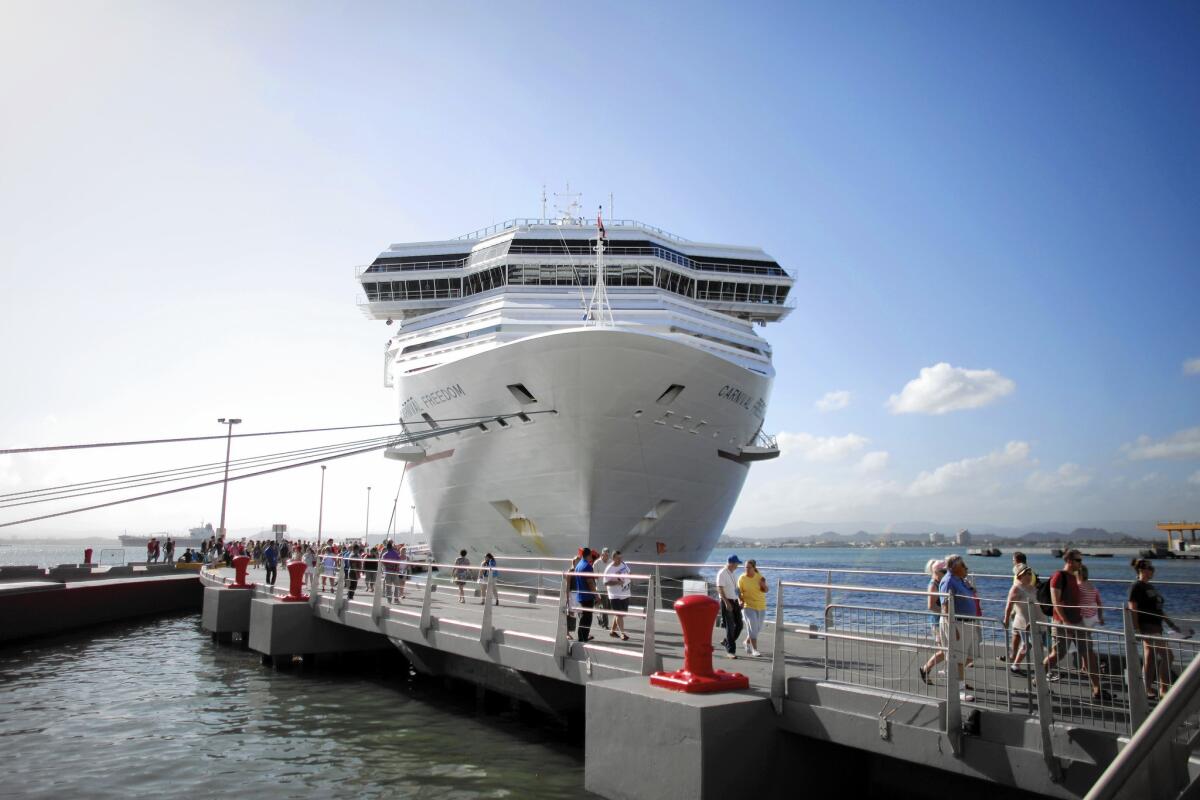Follow these cruise rules and you won’t miss the boat

The scenario makes me shiver: I’m running down the dock, but my ship has already cast off and is pushing away. Someone on the deck waves as the ship gathers speed and sails off into the sunset.
So far, that scenario remains just a bad dream. But every time I leave a ship on an excursion, I worry that the cab or bus or whatever won’t get back in time.
Cruise lines are strict about departure times. If you’re tardy, you may be left standing on the dock when your ship leaves port. And that’s just one of the reasons your trip may come to a quick end — or, in fact, never get started. Here are some of the ways in which you risk missing (or being barred from) the boat:
• Being tardy after a day ashore: A late arrival back at port after a day of sightseeing, for instance, affects the operation of the ship, including its on-time arrival in the next port, according to Cruise Lines International Assn., the trade organization of the cruise industry. Departure times are announced and posted, the association notes. In its rules, Carnival spells out its expectations for passenger returns: They must be back on the ship 30 minutes before departure, and it goes on to note that “shipboard and shore-side clocks may have different times.”
• Behaving badly: All lines have codes of conduct that passengers agree to abide by when they sign their cruise contracts. Violate those and it’s grounds for grounding you. In the last three years, news reports have documented several cases of passengers being ejected, including 16 men who were kicked off a ship in Australia for fighting. In another case, a man who released a cruise ship anchor was fined and sentenced to a federal prison term for attempting to damage a ship.
• Forgetting your documents: Cruise itineraries almost always include a foreign port, so you’ll need a passport. If you forget yours or fail to get a visa required for your itinerary (some lines will take care of visas for you for a fee), you’re probably not going to be allowed on the ship.
“I had a client who tried to use a Costco card to get on a ship because she’d forgotten her passport,” said Loris Fusco, an agent with Montrose Travel. “You need proof of citizenship to get back into the U.S. when you return. That’s not a Costco card.”
• For expectant moms, being too close to delivery date. The last thing a cruise line wants is a baby born at sea, so lines are concerned about due dates and may require medical documentation.
“I always ask honeymooners if there’s a chance they’ll be expecting by the time they go on the cruise,” Fusco said. “I’m not trying to insult anyone. But it might be months before they leave on that cruise and things change.” Most lines have restrictions for pregnant passengers, primarily for those in their third trimester. Before you book a cruise, make sure you look at what the line says about traveling while expecting.
• Being too young. If you have a very young infant, you and baby might not be allowed on the ship. Some cruise lines will not accommodate children younger than 6 months, said the cruise line association. On some lines, a long voyage requires the child to be at least a year old.
• Being ill. Some illnesses can raise a red flag. “You have to fill out forms about your health,” said Jane Shobe, an Orange County vacation consultant for Expedia CruiseShipCenters.com. “That’s how they screen people. And if you’re sick, they might not let you board.”
• Refusing security screening. A ship also will deny passage if you refuse to be screened for weapons or dangerous items, just as you will be denied boarding an airplane if you refuse to go through the Transportation Security Administration checkpoint at an airport.
• Failing to attend safety drills. Don’t try to duck the lifeboat drill. Show up and participate. The safety drills are mandatory. Refusing to participate could lead to being asked to leave the ship.
• Being warned about breaking the rules, then breaking them anyway. Fusco tells the story of clients who set sail on a French Polynesian cruise and insisted on burning candles in their room, a violation of the ship’s rules.
“The first time the maid left them a note,” she said. “The second time, the hotel manager told them to stop. The third time the captain came in and told them to stop or they’d be put off the ship. They stopped.”
::
Cruise tip:
Pack a short power strip or extension cord. As travelers carry more electronic gadgets, demand for electrical outlets in a cabin can outpace supply.
More to Read
Sign up for The Wild
We’ll help you find the best places to hike, bike and run, as well as the perfect silent spots for meditation and yoga.
You may occasionally receive promotional content from the Los Angeles Times.






